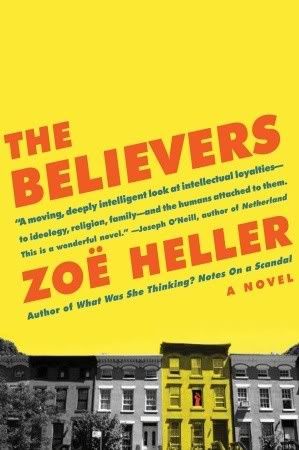The Believers

A summary of the book: The book opens with a prologue set in mid-sixties London, where Joel Litvinoff, an American civil rights lawyer, meets a young Englishwoman, Audrey. After a brief and apparently casual affair, she decides to go to the United States and marry him.
The main narrative then commences in New York in 2002. Joel is 72 and approaching the end of a long and illustrious career as an activist lawyer. He and Audrey live in Greenwich Village and have three adult children: two daughters, Rosa and Karla, and an adopted son, Lenny. Audrey is now an acid-tongued, domineering woman in late middle age who fiercely defends, but never questions, the political stance that has shaped her life. Her most tender feelings appear to be directed towards Lenny, a frequent drug user who is incapable of personal responsibility.
Karla, the neglected and under-appreciated oldest child, is a social worker who is married, not very happily, to Mike. They have been trying unsuccessfully to start a family. Rosa works with disadvantaged young girls. She is becoming increasingly interested in Judaism, a faith rejected along with all others by her Jewish parents. For this she is much derided by Audrey.
Joel suffers a stroke while in court and is in a coma for most of the time span covered by the book. Audrey is convinced he is not getting proper care in the hospital and creates difficulties for its medical staff. During this time of stress, Karla’s unhappiness with her marriage rises to the surface. She begins an affair with Khaled, originally from Egypt, who runs a newspaper store at the hospital where they both work. Rosa immerses herself in the study of Orthodox Judaism and, though she finds many of its teachings difficult to accept, though she perseveres. A stranger, Berenice Mason, introduces herself to Audrey, claiming that her son is Joel’s illegitimate child. Though Audrey initially dismisses her with contempt, it emerges that her story is true and that Berenice has been receiving regular financial support from Joel.
Lenny is persuaded by Audrey’s friend Jean to go to her country home in Pennsylvania for a month in order to get off drugs. He makes great progress there and, when Audrey visits, he proposes settling in Pennsylvania permanently. Appalled by the prospect of losing him, Audrey does her best to discourage the idea. Rosa abandons, and then takes up again, her studies in Orthodox Judaism deciding finally that she must pursue her religious intuitions.
Joel dies without regaining consciousness. At his funeral, which is attended by thousands, Audrey gives a eulogy in which she celebrates her 40-year marriage to her husband and makes a public acknowledgment of Berenice and her son. At the reception afterwards, Karla makes a last-minute, momentous decision regarding her own marriage.
My opinion:
It flows well.
The characters are all people I'd like to throw under a bus. I've heard it said that it's not the job of an author to create characters you want to be best friends with. Okay, so maybe there are authors who like to explore themes and big ideas, and in doing so create a story with a purpose beyond storytelling. And maybe not all characters should be likable because it won't create any conflict and the story will be kind of flat and boring. However, there are enough unlikable people in the world that I have to spend time with; why would I want to sit down and read a book where almost every main character is so loathsome? I swear, by the end of it I was laughing when something happened to piss Audrey off. I honestly don't understand it. Maybe there are families like that out there. But I don't want to know them.
Still, Heller writes well and these people are well-drawn. I also felt some emotions while reading this book (mainly disgust and annoyance, but also some compassion and empathy).
Also annoying is that the author uses British colloquialisms and slang from her American characters. The story takes place in NYC and the mother in the family is English, so I might be able to believe that the Litvinoffs - the family in question - got those phrases from her. But there are plenty of characters who have never set foot outside NYC who use the same expressions, particularly "meant to" in a way that Americans usually use "had to," "have to" and "gotta" (this isn't a direct quote, because I don't feel like taking the time to look one up, but it would read something like this "She was meant to go to the store for bananas" or "he was meant to clean up his mess"). I don't know if this is the editor's problem or the author's, but it became distracting after a while.
All in all if you have the book and don't mind wasting time with horrible characters/people, go for it. There is something compellingly readable about it. Sort of like watching a movie on Lifetime TV